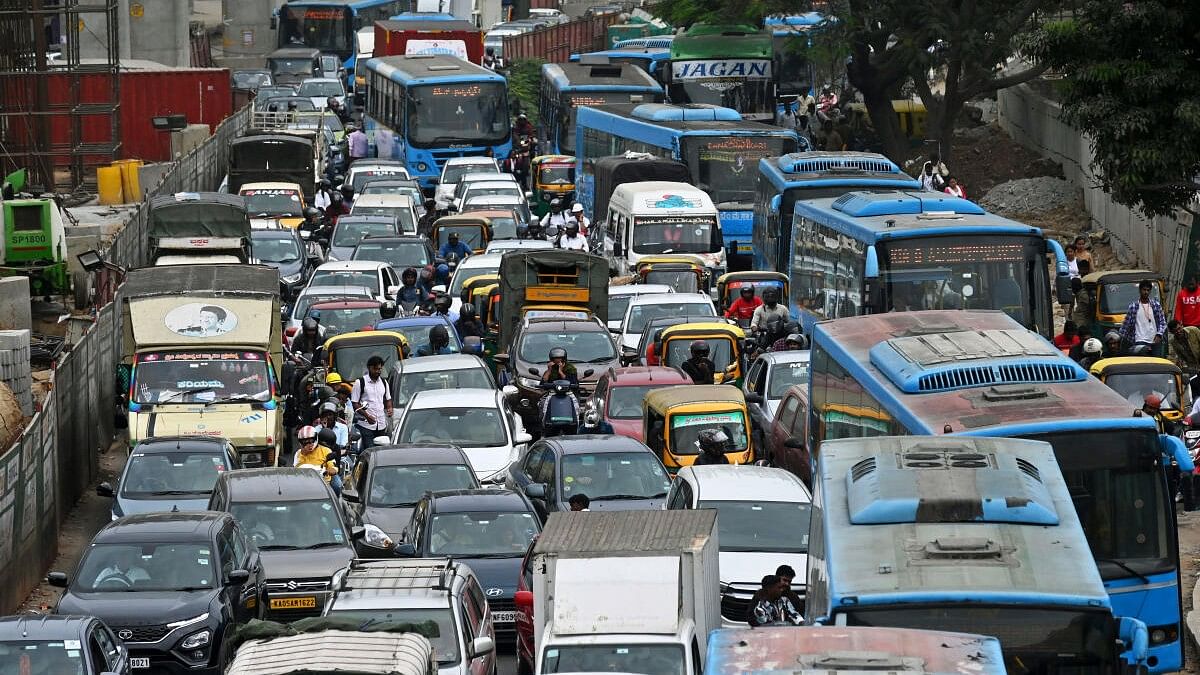
Traffic snarl in Bengaluru.
Credit: DH Photo/Pushkar V
Bengaluru: Bengaluru, the world’s second-most congested city, added an average of 56,124 vehicles per month last year. Nearly 13,000 of them were cars and 29,000 were two-wheelers.
This was also the first time that average monthly vehicle registrations topped 50,000 in a year and average monthly car registrations crossed 10,000.
If this wasn’t bad enough, Bengaluru has many more cars per kilometre than Delhi, the city with the highest vehicle population in India.
Bengaluru has more vehicles per kilometre (761) than Delhi (428). And things could only worsen. Unlike the national capital, Bengaluru is still far away from scrapping overage vehicles. Petrol vehicles older than 15 years and diesel vehicles older than 10 years are not allowed on Delhi roads.
As per the Union government’s Voluntary Vehicle Fleet Modernisation Programme, private vehicles must obtain a fitness certificate after 15 years. A vehicle will be sent for scrapping if it fails the fitness test twice.
Even though Karnataka’s Registered Vehicle Scrapping Policy 2022 stipulates that 14.3 lakh vehicles are fit for scrapping in the state, the state government hasn’t mandated that vehicles that are 15 years or older be scrapped. While the latest data isn’t available, 33 lakh vehicles in Bengaluru were 15 years or older as of March 31, 2023.
Overage vehicles can ply so long as they have fitness certificates, and renew their Registration Certificates (RCs).
Transport Minister Ramalinga Reddy insisted that Karnataka was following the Vehicle Scrapping Policy formulated by the union government.
“Any vehicle that fails the fitness test after 15 years automatically loses registration renewal,” he told DH.
Reddy conceded that the government needed to physically check overage vehicles to ensure compliance.
Government-owned vehicles that are 15 years or older have to be mandatorily scrapped in Karnataka.
An official in the Transport Department said discussions were underway to mandate the scrapping of private vehicles that were 20 years or older but added that no final decision had been taken.
Dr Ashish Verma, professor of Transportation Systems Engineering at the Indian Institute of Science (IISc) and the convenor of IISc Sustainable Transportation Lab (IST Lab), said the road length per vehicle needed to be calculated to understand where Bengaluru stands compared to other cities and countries.
According to him, there is a huge gap between demand and supply — demand being vehicles and supply being road infrastructure — which is
contributing to traffic congestion.
The vehicle growth is exponential and the road infrastructure will and can never match it because our city cannot survive this way, he added.
He suggested disincentivising ownership and usage of personal vehicles by imposing tax on vehicle registration, demanding proof of parking on personal property, imposing a cap on the number of vehicle registrations that can be done in one year, and so on.
Congestion charges, high parking costs, no parking spots in the core areas, priority roads for public transport and priority pedestrian streets are some other ways this can be achieved, he added.